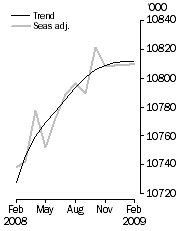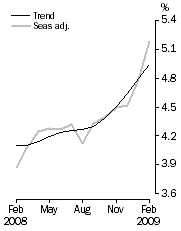This is another one for my students in EC102.
Via the always-worth-reading Peter Martin, I notice that the Australian Bureau of Statistics February release of Labour Force figures contains something interesting: The number of people with jobs increased, but the unemployment rate still went up. Here’s the release from the ABS:
Employed Persons Unemployment Rate FEBRUARY KEY POINTS
TREND ESTIMATES (MONTHLY CHANGE)
- EMPLOYMENT increased to 10,811,700
- UNEMPLOYMENT increased to 561,100
- UNEMPLOYMENT RATE increased to 4.9%
- PARTICIPATION RATE increased to 65.4%
SEASONALLY ADJUSTED ESTIMATES (MONTHLY CHANGE)
EMPLOYMENT
- increased by 1,800 to 10,810,400. Full-time employment decreased by 53,800 to 7,664,200 and part-time employment increased by 55,600 to 3,146,200.
UNEMPLOYMENT
- increased by 47,100 to 590,500. The number of persons looking for full-time work increased by 44,400 to 426,000 and the number of persons looking for part-time work increased by 2,600 to 164,500.
UNEMPLOYMENT RATE
- increased by 0.4 percentage points to 5.2%. The male unemployment rate increased by 0.3 percentage points to 5.1%, and the female unemployment rate increased by 0.5 percentage points to 5.3%.
PARTICIPATION RATE
- increased by 0.2 percentage points to 65.5%.
The proximate reason is that more people want a job now than did in January. The unemployment rate isn’t calculated using the total population, but instead uses the Labour Force, which is everybody who has a job (Employed) plus everybody who wants a job and is looking for one (Unemployed).
$$!u=\frac{U}{E+U}$$
Employment increased by 1,800, but unemployment increased by 47,100, so the unemployment rate ($$u$$) still went up.
Peter Martin also offered a suggestion on why this happened:
We’ve lost a lot of wealth and we’re worried. So those of us who weren’t looking for work are piling in.
I generally agree, but my guess would go further. Notice two things:
- Part-time jobs went up by 55,600 and full-time jobs fell by 53,800 (the difference is the 1,800 increase in total employment).
- The number of people looking for part-time jobs went up by only 2,600 and the number of people looking for full-time jobs rose by 44,400 (yes, I realise that there’s 100 missing – I guess the ABS has a typo somewhere).
There are plenty of other explanations, but I think that by and large, the new entrants to the Labour Force only wanted part-time work and found it pretty-much straight away – these are households that were single-income, but have moved to two-incomes out of the concern that Peter highlights. On the other hand, I suspect that the people that lost full-time jobs have generally remained in the unemployment pool (some will have given up entirely, perhaps calling it retirement).
The aggregate result is that the economy had a shift away from full-time and towards part-time work, although the people losing the full-time jobs are not the ones getting the new part-time work.

